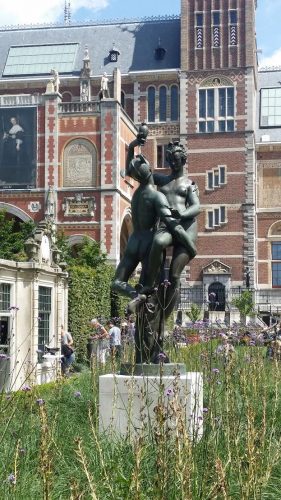I spent the last weekend in Amsterdam within an atmosphere of Deep Democracy, learning how to apply DD principles in organisations. It was a great seminar led by Max and Ellen Schupbach, and was attended by a diverse group of wonderful people.
 My take-away list:
My take-away list:
- In working with organisations, we do not work with organisations, we always work with a specific situation;
- The higher the demands for change that an organisation has, the more you have to be prepared to go beyond political correctness in your work, and address the situation as it is;
- With respect to C.G. Jung’s theory of the “wisdom of the field”, organisational issues are also tied to underlying processes which are, present in the field of that organisation. Work on unfolding, amplifying those subconscious processes, delving into whatever comes up, rather than interpreting events and assuming knowing – how;
- Working within the Deep Democracy concept means considering disturbance as a recourse and working on moving away from the content- moving forwards to the movement of the process;
- There is no redundant information – every bit dances with each other;
- There is never a situation when what you feel in a room full of people, is just what you feel. There always will be at least one more person transmitting the same feelings;
- The moment you or someone else has the feeling of being out of control, the feeling of a conflict arises;
- When I was thinking about how Brexit happened, I learned that there was a Social Network theory– a theory studying how communities develop. Apparently when a community feels that it has grown sufficiently, a trial closure happens – the resentment of newcomers. I very much believe that this can also be applied to organisational dynamics;
- People who have worked with each other for a prolonged period often exaggerate their relationships, and therefore, newcomers can experience a feeling of being left outside. In reality – existing relationships are not as close as they seem to be;
- It is not just organisational cultures that differ, but regional specifics also add to the way an organisation lives. It is wise to respect the differences and peculiarities existing in each culture. However, my personal viewpoint is that due to globalisation and wide travel-work experience, the younger generation is sometimes being marginalized or labelled as “coming from elsewhere or being one of them”. I would suggest getting to know a person prior to making assumptions that his or her background dictates the way they operate. Their birth DNA is there, but epigenetics (experience and environment) have more power on the way people behave today;
- The function of organisational issues (including conflicts) is to create new roles that can’t even be predicted beforehand;
- Privileges and rank play a massive role in most conflict situations;
- The best practice is to develop anything new while working with whatever comes up here and now;
- Polarisations in organisations usually reflect our own inner polarisations. A seemingly small inner-conflict can be a symptom of a larger issue. Bring out an ally character for the disturbance;
- Each object has its own multi-dimensional characteristics. The more you can go into the depth of the role, the more you can discern for yourself. There is nothing outside that is not also inside at the same time;
- The underlying patter of an early memory or “childhood dream” is present in an individual and in organisations as well. When found, an underlying dream becomes a massive resource for both – an individual and organisation. Almost no-one or nothing is born as a tabula rasa – the pattern is already there and when you are in touch with it – it feels like happiness and expansion. Being in a state of a flow, no friction;
- Anyone, any company, which is struggling with size, is actually struggling with existing impact. If desired impact is already there, there are no size or impact issues;
- A message for a consultant or facilitator – if you have a headache before working with a client, work with your headache first;
- If a consultant is being recruited by the opposition (internal), he or she most likely will fail;
- We are seduced by the role we play. Fluidity is the answer for a consultant or a facilitator. Can you still be there and “disappear” at the same time?
Everything you do as a consultant or facilitator, whilst working with organisations, is connected to your own psychology. Fine-tuning never ends.